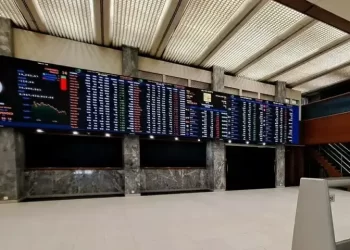Finance Minister Muhammad Aurangzeb has said that the government will provide relief to the salaried class at the first opportunity it gets.
The remarks from the former CEO and president of HBL came during Aaj News programme News Insight with Amir Zia. The show will air at 10pm PST on Monday (today).
“I understands their pain and empathise with them,” said Aurangzeb, referring to the high taxation on Pakistan’s salaried class, as clips of the show were unveiled.
“The first opportunity we get, we will provide relief to them,” he said.
Islamabad enforced new taxation measures of Rs1.761 trillion, taken through Finance Act 2024, from July 1, 2024, including increased tax burden on salaried class and heavy indirect taxation on general public including imposition of sales tax on stationery items, dairy products and poultry feed.
The Finance Act 2024 has enforced income tax measures of Rs443 billion and personal income tax (PIT) increase of Rs224 billion.
Tax slabs in the earlier issued Finance Bill 2024 had revealed that the highest impact would be on anyone earning equal to or more than Rs6 million a year (Rs500,000 a month).
However, the government later amended this and added a 10% surcharge on all individuals and association of persons whose income goes beyond Rs10 million in a year.
The dual measures have invited severe criticism from Pakistan’s working professionals who argue that it is the formal and tax-compliant sector that has come under the hammer again.
While the government did not touch the income tax exemption threshold – which still stands at Rs50,000 – liability increased across all other levels of salaries. For example, a person earning Rs100,000 a month will now pay Rs2,500 a month, up from the earlier level of Rs1,250.
Meanwhile, the finance minister said that the government has taken measures which will compel non-filers to enter the tax net.
“This time, we have taken the margins provided to non-filers to a punitive level. So that those who are non-filers must think three, four, five times why they are not coming into the net,” he said.
On the International Monetary Fund (IMF), the finance minister reiterated that a newer programme is crucial for the economic stability of Pakistan.
“We need permanence in macroeconomic stability, which is why we seek the IMF programme,” he said.
“Efforts will be made to reach a staff level agreement with the Washington-based lender this month (July),” he added.
Finance Minister Muhammad Aurangzeb has said that the government will provide relief to the salaried class at the first opportunity it gets.
The remarks from the former CEO and president of HBL came during Aaj News programme News Insight with Amir Zia. The show will air at 10pm PST on Monday (today).
“I understands their pain and empathise with them,” said Aurangzeb, referring to the high taxation on Pakistan’s salaried class, as clips of the show were unveiled.
“The first opportunity we get, we will provide relief to them,” he said.
Islamabad enforced new taxation measures of Rs1.761 trillion, taken through Finance Act 2024, from July 1, 2024, including increased tax burden on salaried class and heavy indirect taxation on general public including imposition of sales tax on stationery items, dairy products and poultry feed.
The Finance Act 2024 has enforced income tax measures of Rs443 billion and personal income tax (PIT) increase of Rs224 billion.
Tax slabs in the earlier issued Finance Bill 2024 had revealed that the highest impact would be on anyone earning equal to or more than Rs6 million a year (Rs500,000 a month).
However, the government later amended this and added a 10% surcharge on all individuals and association of persons whose income goes beyond Rs10 million in a year.
The dual measures have invited severe criticism from Pakistan’s working professionals who argue that it is the formal and tax-compliant sector that has come under the hammer again.
While the government did not touch the income tax exemption threshold – which still stands at Rs50,000 – liability increased across all other levels of salaries. For example, a person earning Rs100,000 a month will now pay Rs2,500 a month, up from the earlier level of Rs1,250.
Meanwhile, the finance minister said that the government has taken measures which will compel non-filers to enter the tax net.
“This time, we have taken the margins provided to non-filers to a punitive level. So that those who are non-filers must think three, four, five times why they are not coming into the net,” he said.
On the International Monetary Fund (IMF), the finance minister reiterated that a newer programme is crucial for the economic stability of Pakistan.
“We need permanence in macroeconomic stability, which is why we seek the IMF programme,” he said.
“Efforts will be made to reach a staff level agreement with the Washington-based lender this month (July),” he added.









